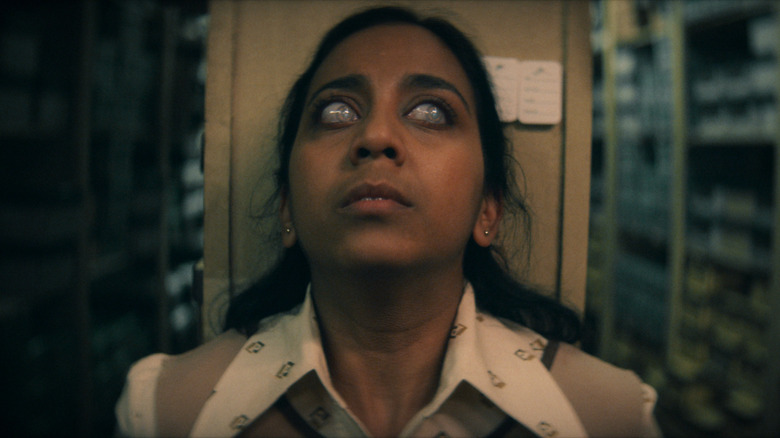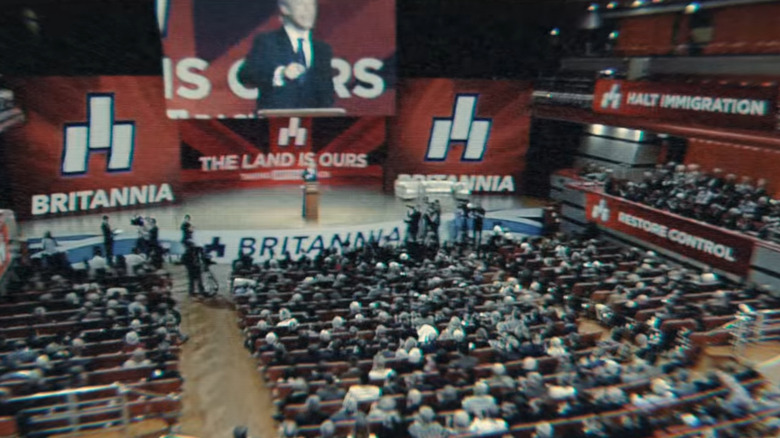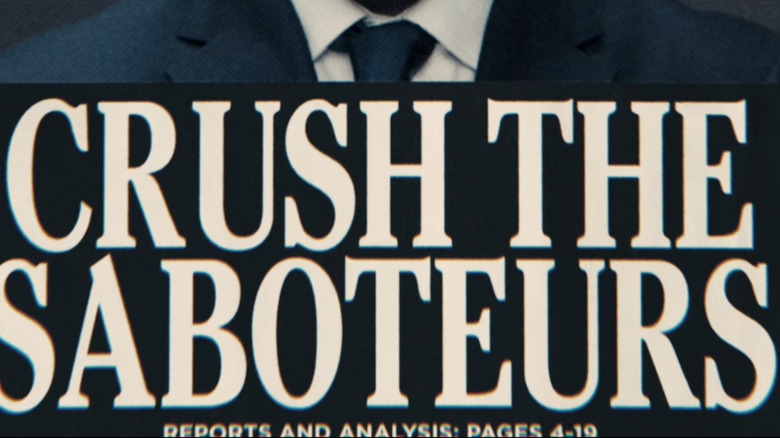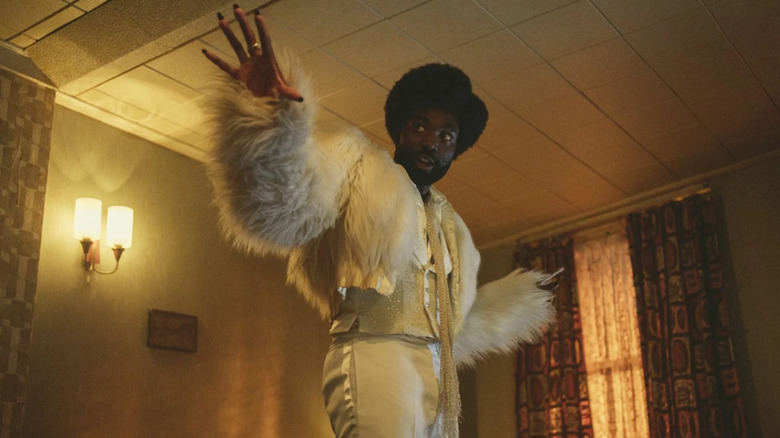Black Mirror Season 6 Creates A Dystopian Nightmare Out Of Real News Headlines
This post contains spoilers for "Black Mirror" season 6.
There are a lot of choices made in "Black Mirror" season 6's final episode, "Demon 79," that probably seemed confusing to viewers. The decision to center its premise in the supernatural has certainly ruffled some feathers, as was the choice to end on the somewhat downer note where the Armageddon happens. Needa (Anjana Vasan) and Gaap (Paapa Essiedu) decide to leave the doomed Earth to enjoy "an eternity in a vacuum of infinite nothingness." We don't know exactly what that experience will be like for the two of them, but we get the sense that maybe it's better than the life they're leaving behind.
The choice to set the episode in the late '70s, however, feels perfectly clear. 1979 was the year the left-wing Labour Party in the U.K. decisively lost the General Election to the very conservative Margaret Thatcher. Thatcher stayed in charge throughout most of the '80s and basically oversaw a major political realignment within the country — one where unions were broken down, the rich had their taxes massively cut, and there was a wide array of deregulation amongst various industries. Although the Labour Party would eventually take back control in 1997, by then the party had abandoned a lot of its leftist ideals. The entire political landscape of the country had moved firmly to the right.
A lot like The Dead Zone
Perhaps most notably, Thatcher's rise in '79 is often credited for the reintroduction of racism back into the country's mainstream discourse. While anti-immigrant sentiments were certainly already there, in the '70s one of the only parties explicitly trying to capitalize on it was the National Front, who were responsible in this episode for the NF sigil marked on Needa's door. As illustrated in the brutal conversation between Needa's co-worker and the far-right politician Michael Smart (David Shields), the NF's outright racism was too alienating to average voters. Smart's more subtle, dog-whistly approach, however? That was far more palatable. While there was no Michael Smart in real life British politics, the parallels to politicians like Thatcher are obvious.
The episode gets even more blatant about this when Gaap shows Needa visions of what would happen if she doesn't kill Smart: it's a bunch of scary-looking headlines, increasingly fascist rhetoric, and an apocalyptic future involving lots of fire and destruction. It's not quite as bad as the nuclear devastation caused by the politician from "The Dead Zone" — which also took place in the late '70s — but it's the same basic premise: if Needa wants to save the country from disaster, she needs to kill this guy before his political career can begin in earnest. But whereas "The Dead Zone" took place around the same time Stephen King wrote the novel, here "Black Mirror" is writing about the same time period from 40-plus years in the future. King's version of the future was pure speculation, whereas script-writers Charlie Brooker and Bisha K. Ali had a lot of real history to draw from.
The real life events
The "Crush the Saboteurs" headline we see in the vision was based on The Daily Mail's actual headline back when Prime Minister Teresa May called for a snap election in 2017. Needa's visions also feature real-life footage of the 2011 London Riots. The footage of the sinking dinghy, meanwhile, was taken from real footage during the 2015 refugee crisis.
Michael Smart's campaign slogans were also clearly based on real life events, with lines like "Take Britain Back" almost certainly being inspired by the pro-Brexit slogan "Take Back Control." Then there's the Rivers of Blood speech we hear a brief bit of Smart giving; this is a reference to Conservative figure Enoch Powell's 1968 speech that strongly criticized mass immigration. "This is the first time that a serious British politician has appealed to racial hatred in this direct way in our postwar history," The Times wrote about Powell's speech in the immediate aftermath. It turned out to be one of the most influential political speeches of the 20th century, and not in a good way.
One of the only parts of these visions that isn't based on real history is the glimpse of the robot dogs, which made their memorable debut in the season 4 episode "Metalhead." But even these wild little creatures aren't fully fictional; they're based on real machines being created and tested by Boston Dynamics. These robot dogs aren't being trained to kill anyone — not yet, at least — but the mere fact that they exist in our world just adds to the plausibility of Needa's visions. Unlike the main character in "The Dead Zone," she's not fighting stuff that happens in the audience's future; she's fighting against stuff the audience has mostly already lived through.
Burn it all down
The full motivation behind basing Needa's visions around real-life events becomes clear in the episode's final act, when Needa fails to kill Smart and ensures the end of the world. There's a brief period where it seems like she may be having a genuine mental breakdown and never needed to go on this murder rampage in the first place, but then the nuclear bombs start going off in the distance. This sounds like a total bummer of a finale, but it isn't. Needa, at least, has the comfort of knowing that she was murdering people for a legitimately good reason, and when she and Gaap head off into oblivion together, it's almost sort of sweet.
The surprisingly peaceful ending feels like a reflection of Needa's growing belief that this world isn't worth saving. Even if the apocalypse didn't happen that night, Michael Smart's rise to power would still take place. Armageddon would still happen, just a couple decades down the line. That feeling of acceptance in the episode's final few moments is rooted in the idea that maybe burning everything down is a better option than letting fascism take over. It's a pretty dark resolution, but from a show like "Black Mirror," we'd expect nothing less.
"Black Mirror" season 6 is now streaming on Netflix.



